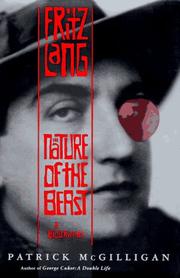Check nearby libraries
Buy this book

The name of Fritz Lang - the visionary director of Metropolis, M, Fury, The Big Heat, and thirty other unforgettable motion pictures - is hallowed the world over. But what lurks behind his greatest legends, and his genius as a filmmaker?
Was he a closet Nazi in Germany, and later, a virtual Communist in America? Did he really refuse an offer from Hitler to become the Third Reich's "Fuhrer of film" before he fled to the United States in the early 1930s, or was this oft-repeated anecdote the embroidered invention of an ingenious storyteller?
Was Lang a sensitive and compassionate artist, as well as a lover of famous women (among them his Berlin compatriot Marlene Dietrich)? Or was he a sado-masochistic beast whose torturous on-set behavior was mirrored, off the job, in a sordid love life crowded with prostitutes and mistresses?
Did Fritz Lang, preoccupied with murder in his work, in fact kill his own first wife - who died mysteriously in his presence after catching him in the arms of the Nazi-leaning screenwriter who became his second wife?
Patrick McGilligan spent four years in Europe and America, interviewing Lang's dying contemporaries, researching government and film archives, and investigating the life story of Fritz Lang. His definitive biography - the only such book on Lang, who encouraged publicity but discouraged the truth - reconstructs the fascinating, flawed human being behind the monster with the monocle.
Check nearby libraries
Buy this book

Previews available in: English
People
Fritz Lang (1890-1976)Places
United States| Edition | Availability |
|---|---|
|
1
Fritz Lang: The Nature of the Beast
November 1998, St. Martin's Press
Paperback
in English
0312194544 9780312194543
|
zzzz
Libraries near you:
WorldCat
|
| 2 |
aaaa
Libraries near you:
WorldCat
|
Book Details
Edition Notes
Includes bibliographical references and index.
Filmography: p. [483]-503.
Classifications
The Physical Object
ID Numbers
Source records
Scriblio MARC recordmarc_cca MARC record
Ithaca College Library MARC record
Internet Archive item record
marc_openlibraries_sanfranciscopubliclibrary MARC record
Library of Congress MARC record
marc_nuls MARC record
Better World Books record
marc_columbia MARC record
Work Description
An adroit and revealing biography of the talented director of such classics as Metropolis and M. Few directors weathered the transition from silent movies to sound as successfully as Lang. His success in doing so may have been, in part, due to the fact that his aesthetic remained essentially visual, a masterful and calculated use of angles, framing, and lighting. Beyond their usefulness in creating tableaux vivants, actors were, he seemed to feel, more of an annoyance than anything else. Not surprisingly, the notoriously perfectionist Lang mistreated some very high-priced talent, including Peter Lorre, Spencer Tracy, and Marlene Dietrich, as well as a raft of hapless producers. As Henry Fonda once remarked: `It just doesn't occur to him that actors are human beings. . . . He is the master puppeteer, and he is happiest only when he can manipulate the blank puppets.' '' Only perhaps in M, the tale of a wretched child-killer, did Lang achieve a full and rich psychological portrait. With his ever-present monocle and soldierly bearing, Lang seemed the epitome of the autocratic Prussian, but in truth he was not only Viennese but half-Jewish and a committed leftist. Soon after Hitler came to power, Lang--then considered Germany's greatest director--went into self-imposed exile in Hollywood. He was a dedicated mythomaniac, and veteran film biographer McGilligan (Jack's Life, 1994, etc.) does an extraordinarily thorough job of separating Lang fact from Lang fable. Despite the constant battles on the set and budget overruns, Lang worked well into his 70s. His retirement years, however, were pure Sunset Boulevard, as the nearly blind Lang kept detailed diaries of the minutiae of his day, conversed with his wooden pet monkey, Peter, and had longtime live-in ex-lover Lilly Latte regularly procure him prostitutes. McGilligan is not a graceful stylist, but he has a great story to tell, and he tells it with verve, originality, and insight. (32 pages b&w photos, not seen)
Community Reviews (0)
Feedback?History
- Created April 1, 2008
- 15 revisions
Wikipedia citation
×CloseCopy and paste this code into your Wikipedia page. Need help?
| August 7, 2024 | Edited by MARC Bot | import existing book |
| April 17, 2024 | Edited by ImportBot | import existing book |
| March 8, 2023 | Edited by MARC Bot | import existing book |
| November 23, 2020 | Edited by MARC Bot | import existing book |
| April 1, 2008 | Created by an anonymous user | Imported from Scriblio MARC record |
















